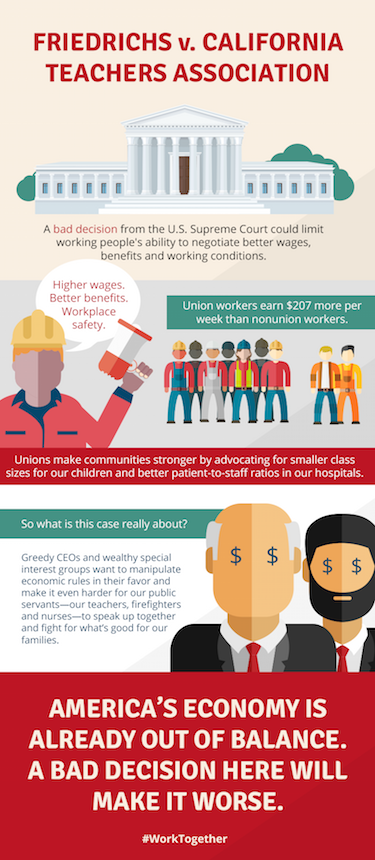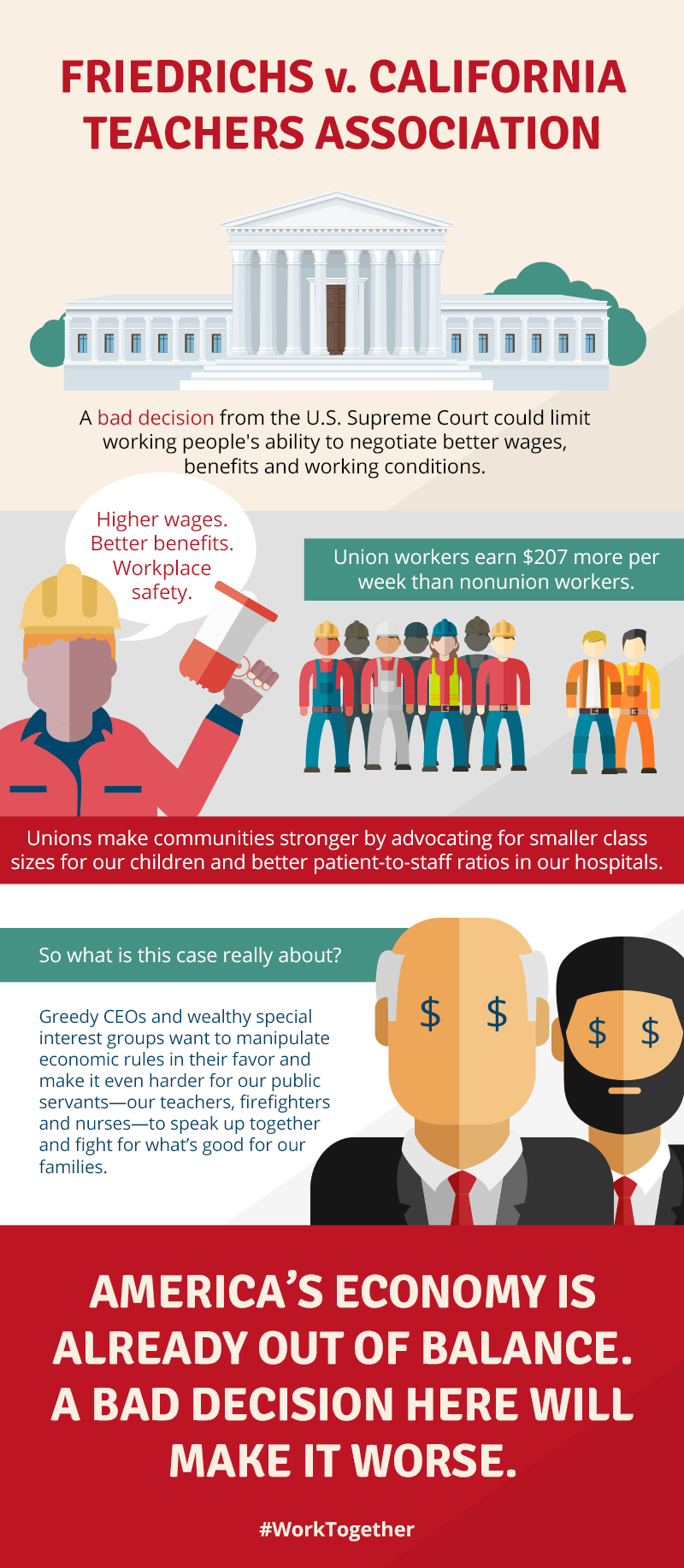January marks the beginning of an important year for the labor movement. In November, voters will head to the polls to decide America’s next president, the makeup of Congress, and countless state and local offices, any combination of which could have an enormous effect on working people and the middle class.
But long before those ballots are even printed, much less cast, the Supreme Court will hear and decide a little-known case with wide-ranging implications for trade unionism.


|
| Graphic courtesy of America Works Together, a coalition of working people, unions, and others working to preserve bargaining rights for the middle class. |
Scheduled for oral arguments in January, Friedrichs v. California Teachers Association threatens to turn all federal, state, and local government workplaces into right-to-work shops, circumventing the voters and their elected representatives who have rejected such anti-labor measures time and time again.
The case involves a small group of California teachers, led by Orange County’s Rebecca Friedrichs, who object to paying the so-called fair share fee that covers the cost of collective bargaining, contract administration, and grievance adjudication—all services the union is required by law to provide to members and non-members alike.
But don’t be fooled into thinking this case is just a few mild-mannered teachers facing off against “big labor,” as many conservative voices would have you think. In fact, Friedrichs and her cohorts are backed by the very same big-business, anti-union billionaires who have sponsored right-to-work legislation across America.
Right to Work. Wrong for America
Right-to-work, is, of course, horribly mislabeled. Visiting a Michigan auto plant the day before that state’s governor signed the legislation in 2012, Barack Obama described it a little more accurately – “Right to work for less money.”
An Ohio public school cafeteria worker, Tina Adams, described it even better in a recent article for the National Education Association’s website. Calling attacks on working people, “right-to-work,” she said, is “like calling bologna an artisan meat.”
In right-to-work states, all 25 of them, workers who object to a union’s political activities can not only opt out of the political fees, as anyone can, but they can also refuse to pay the union’s “fair share” fee to cover costs of collective bargaining, contract administration, and grievance adjudication. This, of course, creates what is referred to as a “free-rider” problem, because the union remains legally obligated to represent even non-members to management.
The plaintiffs in the Friedrichs case are attempting to do the same thing, challenging decades-old settled law from the 1977 case, Abood v. Detroit Board of Education, which held that unions could charge employees for the administrative costs of bargaining even if that person chose to remain a non-member to avoid contributing to the organization’s extra political costs.
In Friedrichs, the plaintiffs are making virtually the same argument that the Abood plaintiffs did nearly 40 years ago, suggesting that any interactions with public officials, even collective bargaining, are “free speech,” and thus forced participation is in violation of the First Amendment to the Constitution.
“That argument is ridiculous,” said IBEW Government Employees Department Director Dennis Phelps, who represents tens of thousands of the union’s civil service members ranging from linemen to law enforcement. “The relationship between an employee and an employer is just fundamentally different from the one between a lobbyist and a government, and the Supreme Court affirmed that back in 1977. Public employees have a right to be represented just the same as private employees do, and we hope the court sticks to precedent and agrees with us.”
If history is any indicator, even conservative justice Antonin Scalia may agree with labor’s position, as he rationalized the Abood decision in a 1991 case, Lehnert v. Ferris Faculty Association. Unions, he wrote, need “the services of lawyers, expert negotiators, economists, and a research staff, as well as general administrative personnel,” adding that fair share fees are key to discouraging free-rider status.
Big Business, Not Teachers, are Waging this Battle
At the heart of the push behind Friedrichs is a little-known organization called the Center for Individual Rights, founded in the late 1980s, and until now, focused primarily on eliminating affirmative action and curtailing the 1965 Voting Rights Act. But a quick glance behind the curtain reveals that CIR’s donors are a who’s who of conservative billionaires and CEOs, none more prominent than Charles and David Koch.
The Koch Brothers and their flagship political organization, Americans for Prosperity, have been behind the successful right-to-work campaigns in Michigan in 2012 and in Wisconsin earlier this year. The group also spent more than $10 million supporting Wisconsin governor Scott Walker in 2011 and 2012 when the anti-union executive stripped collective bargaining rights from all public employees in the state and then faced a contentious recall election.
Most recently, the Kochs spent hundreds of thousands of dollars funding an unsuccessful campaign to overturn Missouri governor Jay Nixon’s veto of right-to-work legislation in September. Thanks to the efforts of the IBEW and its labor allies in the state, the anti-union forces were defeated, but the group is currently embarked on a second effort to punish the 20 Republican legislators who sided with Democrats with an eye to reviving the right-to-work bill next session.
The defeat in Missouri, however, helps to explain the shift in strategy – or the parallel strategies – that led right-to-work to the steps of the Supreme Court. Faced with a court they believe are sympathetic to their cause, the Koch-backed lawyers actually argued against their own case in every lower court just so they could speed the case to the Supreme Court even faster.
Whichever way the Supreme Court decides Friedrichs before the end of its term in June, one thing is clear: the powerful corporate interests that are backing this effort are unlikely to stop here.
In Wisconsin, after the Americans for Prosperity-backed 2011 effort that nearly destroyed the state’s public sector unions, membership dropped nearly 80 percent and those who were left saw their healthcare costs rise by an astonishing $400 per month.
In an economy that is already out of balance, this case threatens to make things even worse for the working men and women of the middle class, moving the rest of the country toward the Wisconsin model. Eliminating fair share fees and making right-to-work the law of the land is just the first step in the Koch network’s plan to install a permanent conservative majority, coupled with the nearly $900 billion they have pledged to spend during the 2016 election cycle.
AFP’s president, Tim Phillips, copped to his fear of labor when speaking to Republican activists in January 2011. “[The Democrats] had public employee unions,” he said, trying to explain GOP losses in decades past. The unions, he warned, “have only gotten stronger, have only gotten better funded, have only gotten better organized in the period of time between the 1990s and today.”
And his organization’s attack on public sector unions – including the IBEW’s tens of thousands of public sector brothers and sisters – is only a test case for a larger push that is inevitably coming if the court rules in favor of Friedrichs and her billionaire backers.
As International Secretary-Treasurer Salvatore J. Chilia wrote in December’s Electrical Worker, “Don’t think for a minute that a negative ruling is only bad for public employees. A decision for the Friedrichs plaintiffs could set a dangerous precedent for the rest of our members in the private sector as well.”
Photo used under a Creative Commons license from Flickr user Davis Staedtler.